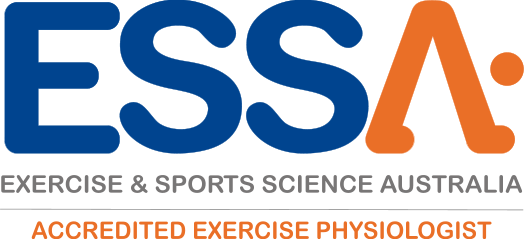Introduction & Definition
Despite Exercise Physiology being a now well established profession there remains some confusion about what Exercise Physiology is and how it fits in the broader exercise profession landscape (compared to Physiotherapists and Personal Trainers).
Exercise Physiologists are university qualified allied health professionals who are educated to design, deliver and evaluate safe and effective exercise interventions for everybody. This includes people with acute, sub-acute or chronic medical conditions, injuries or disabilities.
Certain conditions, injuries or disabilities have special needs that must be considered for before exercise interventions can be provided. This is where the university education Exercise Physiologists receive sets them apart from a personal trainer.
Accredited Exercise Physiologists (AEPs) are qualified to provide compensable health services under Australia’s different healthcare schemes. Exercise Physiologists without this accreditation can not provide these compensable services.
Exercise & Sports Science Australia (ESSA) is the peak professional body and sole accrediting authority for Accredited Exercise Physiologists.
Who can benefit from Exercise Physiology
Exercise Physiologists can provide evidence based exercise interventions for many conditions, injuries or disabilities. Some of the more common include:
- Cardiovascular (High Blood Pressure, Heart Disease)
- Metabolic (Type 2 Diabetes, Hypothyroidism etc.)
- Neurological (Stroke, Parkinson’s, Cerebral Palsy etc.)
- Musculoskeletal (All injuries)
- Cancers
- Kidney
- Respiratory / pulmonary (Asthma, COPD etc.)
- Mental health (Depression, Anxiety etc.)
Exercise Physiology Services
Apart from health services for people classified as ‘healthy population’, (the same as personal training), Accredited Exercise Physiologist’ (AEP)’s can deliver compensable services in Australia under five (5) main health frameworks. These are:
- Medicare
- DVA
- Private Health Insurance
- NDIS
- Workers Compensation
People may receive discounted services, in the form of rebates, or fully compensated Exercise Physiology services under these schemes. Eligibility conditions apply.
Medicare & Exercise Physiology
A referral from a GP is required for all of the below services. These services are for patients with one or more medical conditions that have been (or are likely to be) present for at least 6 months. Rebates apply.
- Clinical exercise services via a Chronic Disease Management (CDM) Plan: Individual allied health sessions maximum 5 per calendar year
- Follow up allied health services for Indigenous Australians: maximum 5 per calendar year – can be additional to individual allied health sessions.
- Type 2 Diabetes allied health group services:
Individual initial assessment and maximum 8 group sessions per calendar year.
DVA & Exercise Physiology
You may receive Exercise Physiology services if you have an assessed clinical need and a:
- Veteran Gold Card; or
- Veteran White Card and your treatment is for an accepted service-related condition
And you:
- have a chronic disease; or
- are recovering after a hospital stay for treatment of a major injury or illness
AEPs are eligible to deliver services in a range of environments including:
- Individual sessions
- Group sessions
- Aquatic sessions
Referrals under the treatment cycle are eligible for up to 12 sessions: Initial cycle referrals can come from usual GP, medical specialist or as part of a hospital discharge (allied health professional). Only the usual GP can refer for subsequent cycles.
Accredited Exercise Physiologist bulk-bills DVA (no gaps charged).
Workers Compensation & Exercise Physiology
Accredited Exercise Physiologists can provide rehabilitation services under the workers compensation scheme. This includes for workplace injury or mental health claims. Insurer approval must be obtained prior to undertaking the service.
Note: the below services may differ in each state/territory.
Initial Consultation/Assessment:
- Review of current medical and vocational status.
- Communication/liaison with relevant parties.
- Physiological Assessment/testing.
- Screening Questionnaires relating to worker’s level of function.
- Program design based on above.
- Exercise facility/equipment coordination (pool or gym based).
Subsequent Exercise Consultation/Assessment Includes –
- Program implementation – prescription and provision of exercises (land or pool based);
- Program monitoring;
- Post program screening questionnaire relating to worker’s level of function.
- Communication/liaison with relevant parties.
Approved services will be billed to insurer directly.
Professional Standards
Exercise Physiologists are required to meet minimum practice standards and complete ongoing education in order to remain accredited and up to date with industry standards.
To gain accreditation with ESSA an individual must:
- Graduate from a minimum 4 years of study in an ESSA accredited course meeting the requirements that leads to bachelor degree qualifications.
- Meet the professional standards for exercise science, leading to accreditation as an Exercise Scientist, including 140 hours of practical experience for the purpose of undertaking an exercise intervention to improve health and fitness, wellbeing or performance, or focus on prevention of chronic conditions
- Meet the professional standards for exercise physiology, including 360 hours of practical experience with clients with clinical conditions (e.g. cardiovascular, pulmonary, metabolic, musculoskeletal, neurological)
To maintain accreditation with ESSA, an AEP is required to:
- Hold and maintain a valid first aid and CPR certificate
- Hold and maintain appropriate insurance.
- Meet annual further education/professional development requirements
- Uphold the ESSA Code of Professional Conduct and Ethical Practice
